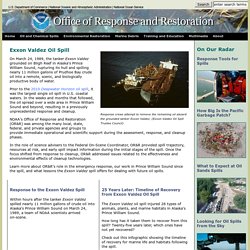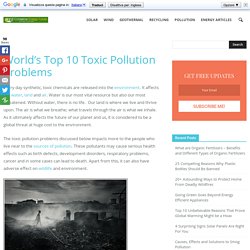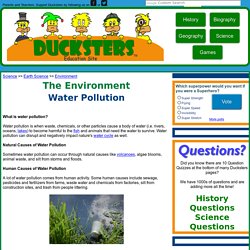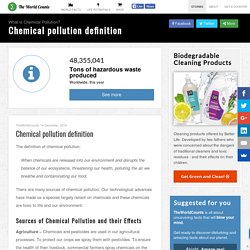

Oil and Chemical Spills/Significant Incidents/Exxon Valdez Oil Spill. On March 24, 1989, the tanker Exxon Valdez grounded on Bligh Reef in Alaska's Prince William Sound, rupturing its hull and spilling nearly 11 million gallons of Prudhoe Bay crude oil into a remote, scenic, and biologically productive body of water.

Prior to the 2010 Deepwater Horizon oil spill, it was the largest single oil spill in U.S. coastal waters. In the weeks and months that followed, the oil spread over a wide area in Prince William Sound and beyond, resulting in a previously unprecedented response and cleanup. NOAA's Office of Response and Restoration (OR&R) was among the many local, state, federal, and private agencies and groups to provide immediate operational and scientific support during the assessment, response, and cleanup phases.
In the role of science advisers to the Federal On-Scene Coordinator, OR&R provided spill trajectory, resources at risk, and early spill impact information during the initial stages of the spill. World's Top 10 Worst Toxic Pollution Problems. Every day synthetic, toxic chemicals are released into the environment.

It affects our water, land and air. Water is our most vital resource but also our most threatened. Without water, there is no life. Our land is where we live and thrive upon. The air is what we breathe; what travels through the air is what we inhale. The toxic pollution problems discussed below impacts more to the people who live near to the sources of pollution. Here is a list of the Top 10 Toxic Pollution Problems our world faces today, in no particular order: 1. These rechargeable batteries are composed of lead plates and sulphuric acid in a plastic case. 2. More than two million people globally are affected by mining and ore processing. 3. Though it’s often overlooked, the high levels of mercury in the air are a serious threat to human health. 4. The production process of retrieving gold from mined ores releases more mercury than any other global sector. 5. 6. 7. 8. 9. 10. Image credit: Rinkesh. Environment for Kids: Water Pollution. Science >> Earth Science >> Environment What is water pollution?

Water pollution is when waste, chemicals, or other particles cause a body of water (i.e. rivers, oceans, lakes) to become harmful to the fish and animals that need the water to survive. Water pollution can disrupt and negatively impact nature's water cycle as well. Natural Causes of Water Pollution Sometimes water pollution can occur through natural causes like volcanoes, algae blooms, animal waste, and silt from storms and floods. Human Causes of Water Pollution A lot of water pollution comes from human activity. Oil Spills Some of the most famous incidents of water pollution have been oil spills. Acid Rain Air pollution can also have a direct effect on water pollution. Effects on the Environment Water pollution can have disastrous effects on the environment. Pollution in the water can reach a point where there isn't enough oxygen in the water for the fish to breathe.
Water pollution warning sign Effects on Health. Environmental Threats. What is Chemical Pollution? - The World Counts. TheWorldCounts, 14 December, 2014 The definition of chemical pollution: When chemicals are released into our environment and disrupts the balance of our ecosystems, threatening our health, polluting the air we breathe and contaminating our food.

There are many sources of chemical pollution. Our technological advances have made us a species largely reliant on chemicals and these chemicals are toxic to life and our environment. Sources of Chemical Pollution and their Effects Agriculture – Chemicals and pesticides are used in our agricultural processes. Read More: Environmental Degradation Facts Transportation – Emissions from the vehicles we use in our daily lives contribute to air pollution. Read More: How Pollution Affects the Environment Household Chemicals – Aerosols and regular household cleaning products may look innocent but a lot of consumer products are pollutants. Industries and Factories – Hazardous waste comes from factories that do not dispose of them properly. References.